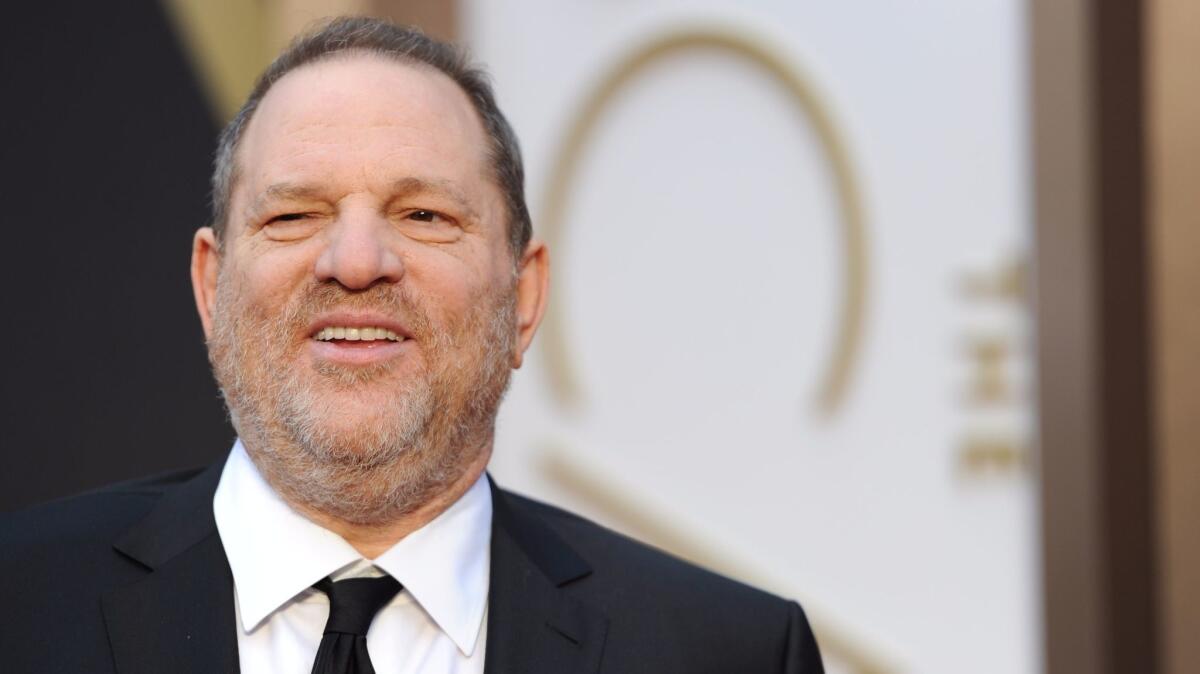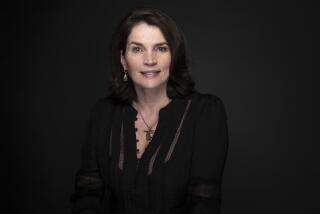Perspective: Weinstein sex accusations show the power of social media and the limits of shame in our celebrity-driven world

Note to men with unseemly, to say nothing of perverse, intentions: There are no more hiding places.
Twitter, Facebook and other social media outlets are the town criers of our petulant, righteous age. They are where we rant, titillate, philosophize, sermonize and, in the case of the sex scandals, unmask and shame our latest objects of wrath, including Harvey Weinstein, James Toback and Bill O’Reilly. The constructs and labyrinths of secrecy that once protected these men have been shattered by emboldened victims and a social media that hurtles from zero to gale force in the time it takes to type @outrage.
To scroll Twitter is to wince at transgressions piled up like car crashes. One never knows whose name might next pop up: wheelchair-bound former President George H.W. Bush patting women’s rears, MSNBC analyst Mark Halperin saying some of his behavior was inappropriate and, in this expanding and unbecoming gallery, the flood of claims against Roger Ailes, Bill Cosby and Toback, who himself has more than 300 accusers. The numbers are shocking and sad, a defiant, primal scream by alleged victims.
What was once hidden is being revealed in a lurid pageant propelled by bursts of 140 characters and unflattering videos and pictures. Social media has taken public opinion global, connecting the planet to joys, misdeeds, revolutions, refugee crises, famines, and increasingly the sins of powerful men. The sexual assault and harassment allegations against Weinstein, Toback and O’Reilly have given us a modern-day twist on Nathaniel Hawthorne’s “The Scarlet Letter” and the unwashable stain of the fallen.
Or has it? There are troubling questions in all this. Has our media-driven world, the way our lives are saturated with scandals and endless dramas on immorality, raised the threshold for shame so high that it has lost its enduring sting? Has hubris become the shield of disgrace?

After the accusations against him were made public, Weinstein apologized but tried to explain his actions away, first noting that he was a product of ’60s and ’70s anything-goes culture, then suggesting he could fix himself through therapy. Toback said he had diabetes and a heart condition that made it “biologically impossible” for him to engage in the sexual behavior he’s been accused of.
Even after numerous allegations against O’Reilly, which led to $13 million in settlements, the Fox News network, according to the New York Times, signed the host to a four-year $25 million annual contract in February after he paid $32 million to settle another sexual harassment claim. O’Reilly has denied he did anything improper over the years.
And there’s Donald Trump, who after boasting that he grabbed women’s genitals, was elected president.
Writers from the ancient Greeks to today’s novelists have wrestled with shame and its place in the human soul. What it does to the conscience, how it shapes our views of right and wrong, and leaves — or at least did — a profound echo through one’s life. William Shakespeare wrote in “King Lear” that “Time shall unfold what plighted cunning hides. Who cover faults, at last shame them derides.” But his words as spoken by “Hamlet” are more reflective of where we are today: “Oh shame! Where is thy blush?”
The #MeToo Twitter campaign has swept the globe, connecting women, famous and not, through shared stories of sexual abuse and harassment. Many women said they felt shame, which society has levied on them more harshly than men when it comes to matters of sex. Shame is the weapon their predators used to hush them. Their attackers knew how to deploy the inference of the very word they should have been feeling themselves. That is changing.
“I have been silenced for 20 years,” Rose McGowan, who has accused Weinstein of rape, was quoted as telling the Women’s Convention in Detroit on Friday. “I have been slut-shamed. I have been harassed. I’ve been maligned and you know what? I’m just like you. What happened to me behind the scenes happens to all of us in this society and that cannot stand, and it will not stand. We are free. We’re strong.”
The furor over the Weinstein allegations is a defining moment in women’s rights, the latest iteration in a feminist movement that has intensified since Trump’s election. Social media have given rise to what is at once cyber theater and the court of public opinion. It will be more difficult for men like Weinstein to linger in the shadows or in bathrobes behind hotel room doors.
But the fierce backlash against sexual harassment comes when notions of decency are being reshaped by the same social media that are holding Weinstein accountable. It’s as if we’re scrolling back and forth in parallel universes where rage demands justice but shame for predators does not cut as deep as it once did.
The faces and stories of the alleged victims of Cosby, Weinstein and others have been published and tweeted. They rivet and move us. But the cycle spins and new faces and new stories emerge, all feeding a cacophony that over time numbs. What was once unforgettable becomes less so. The machine churns on, our eyes flit to new headlines, but we seldom hear the simple, searing words: “I am ashamed for what I have done.”
See the most-read stories this hour »
Twitter: @JeffreyLAT
ALSO
Voices of the City: Robin Coste Lewis’ fierce and arresting poetry has its roots in Compton
More to Read
Only good movies
Get the Indie Focus newsletter, Mark Olsen's weekly guide to the world of cinema.
You may occasionally receive promotional content from the Los Angeles Times.











